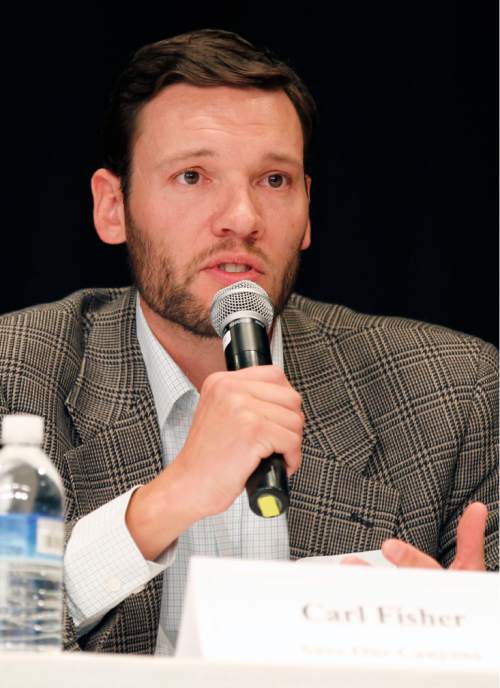This is an archived article that was published on sltrib.com in 2016, and information in the article may be outdated. It is provided only for personal research purposes and may not be reprinted.
For nearly three years Mountain Accord stakeholders, representing diverse interests, have labored to arrive at long-term solutions to the many issues facing our majestic and much loved Wasatch Mountains. We've set aside substantial partisan and ideological differences to achieve the delicate balance that is our proposed federal legislation for the Wasatch.
After all this work, it's alarming to see a county mayoral candidate politicize and misrepresent the Mountain Accord for short-term personal political gain. By distorting the facts in his piece in The Salt Lake Tribune, Dave Robinson undermined the consensus-building efforts that the Mountain Accord represents. Fortunately, Robinson's arguments against Mountain Accord are like skiing crust: from afar they look enticing, but when tested they totally collapse under the weight of reality.
The Mountain Accord has several aims, which include resolving long-standing access issues and user conflict, improving transportation in an environmentally sustainable manner, responsibly stewarding our natural resources and watershed for future generations, ensuring quality recreation experiences and preserving the Wasatch's integral role in our thriving economy. When polled in 2012, 92 percent of Utahns stated they'd like to see the Wasatch protected from additional development and recreational access preserved. As a member of the Mountain Accord Executive Committee, these are the principles I've advocated and which I believe we've succeeded in incorporating in the accord.
The Wasatch Mountains receive nearly 6 million annual visits, more than the combined visitation to all of Utah's national parks. Finding a long-term solution to accommodating such intense use requires careful study and thoughtfully considered action. In addition to furthering desired transportation studies, Mountain Accord will result in significant wins that will end decades-old public lands disputes.
Mountain Accord has also initiated environmental monitoring to establish a base line that will be used to monitor the ecological health of the Wasatch.
Most importantly, the accord has initiated draft legislation to protect this most treasured landscape and enable land swaps to help clean up remnants of a mining history that has fragmented ecosystem management efforts and long frustrated biologists, land managers and the public. These land swaps offer ski resorts a minimal amount of land near their bases in return for giving up land on some of our most iconic peaks and areas higher in the canyons. The ski resorts have also agreed not to seek more expansion beyond existing boundaries — a significant victory for the overwhelming majority of citizens who don't want additional commercialization of our delicate alpine environment.
The accord's proposed legislation designates nearly 80,000 acres of public land as a National Conservation and Recreation Area. This visionary change in management, not ownership, will require that the Forest Service better protect and manage prized public lands and our watershed. While this is a significant win for conservation, it also a win for recreationists from picnickers to hikers, bikers and climbers — residents and visitors alike.
Western public lands issues have become the center of our national political dialogue. Around the West, disputes have flared into heated rhetoric that has threatened to erupt in violence. Meanwhile, by engaging in civil dialogue and putting partisan politics aside, the Mountain Accord has successfully navigated the obstacles that have caused other public lands initiatives to fail.
There have been challenges along the way and important work remains. However, the leadership of Salt Lake County Mayor Ben McAdams and Sandy Mayor Tom Dolan, along with dozens of other elected officials, and the dedication of more than 200 civic groups who have dedicated time and labor to the accord's success, shows the value of Mountain Accord and the importance of getting this work right.
Carl Fisher is executive director of Save Our Canyons.



